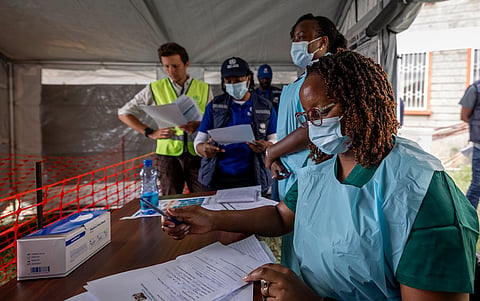

Public spending cuts in Africa resulted in the incomes of health and education workers falling by up to 50 per cent in five years, leaving them struggling to make ends meet, according to a new report by ActionAid, an international non-profit.
The report, titled The Human Cost of Public Sector Cuts in Africa, was published on May 20, 2025.
The analysis revealed the devastating impact of public spending budget cuts on health and education systems across six African countries — Ethiopia, Ghana, Kenya, Liberia, Malawi and Nigeria.
Six hundred and sixteen healthcare workers, teachers, and community members across the six countries were surveyed. This revealed stark indicators of crisis.
The salaries of teachers dropped by up to 50 per cent over the past five years and 97 per cent of healthcare workers reported that their income no longer covered basic needs like food, electricity and household expenses.
The International Monetary Fund (IMF) is to blame for these countries’ failing public systems, the report said, as the agency advises governments to significantly cut public spending to pay back foreign debt.
Across the six countries surveyed, an average of 40 per cent of teachers reported a reduction in income, 34 per cent of teachers reported strain on personal relationships because of an increase in workload and 44 per cent of teachers planned to leave the profession.
Cuts to public budgets since 2020 have slashed essential funding. In the education sector, 87 per cent of teacher respondents cited a shortage of essential classroom furniture and reduced access to teaching materials and 73 per cent of education sector workers have had to purchase resources themselves.
Country-specific analysis of the survey revealed that Nigeria experienced the most severe school level budget cuts in the last three to five years. In Ethiopia, the impact on resources was most acute, with 100 per cent of workers reporting a significant decline in school furniture and book supplies.
The survey of 143 frontline health workers (66 per cent of them women) from six African countries revealed a crisis in the public health sector marked by inadequate pay, deteriorating working conditions, rising workloads, and mental health challenges.
During the survey, 87 per cent of health workers reported a scarcity of medical equipment and supplies due to insufficient budgets, and 84 per cent reported severe shortages in staff, leading to longer wait times and a decline in service quality.
Country-specific analysis revealed significant budget shortages for equipment and medicines in local health centres across all survey countries. The highest levels of shortages were reported by health workers in Kenya (96 per cent), Ethiopia (95 per cent), and Malawi (95 per cent).
The document urged African governments to reject coercive IMF policies, seek debt relief or cancellation, and expand tax revenues in fair ways to rebuild public health and education workforces and infrastructure.